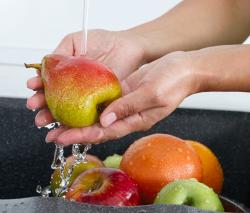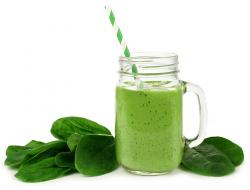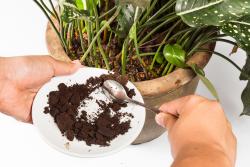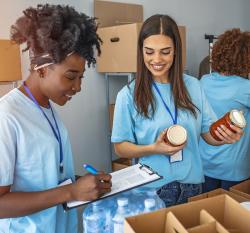Staying Safe – Washing Fruits and Vegetables
Recipe and Nutrition Tips – Green Pear Smoothie
Physical Activity Tips – Increase Physical Activity at Home with a Scavenger Hunt
Food Access Resources in Massachusetts – Food Assistance during COVID-19
Staying Safe
 Summer is the perfect time to enjoy a refreshing and healthy smoothie. When choosing fruits and vegetables for your smoothie, follow these tips to keep you and your family safe.
Summer is the perfect time to enjoy a refreshing and healthy smoothie. When choosing fruits and vegetables for your smoothie, follow these tips to keep you and your family safe.
- Produce grown in a home garden or purchased from a farmers’ market, CSA, or grocery store should be washed before eating, cutting, or cooking.
- Rinse fruits and vegetables under cold running water – even if you do not plan to eat the peel. Bacteria on the outer skin can get inside when you cut into produce.
- Use a vegetable scrub brush to help wash away dirt and germs on produce with a thick skin, like melons.
- Produce with nooks and crannies, like cauliflower, broccoli, or lettuce, should be soaked in cold, clean water.
- Fragile produce, like berries, should be rinsed and gently dried with a clean cloth or paper towel.
- Never use soaps, detergents, or bleach solutions to wash fresh fruits and vegetables.
Recipes and Nutrition Tips
 Looking for a way to sneak more fruits and vegetables into your day?
Looking for a way to sneak more fruits and vegetables into your day?
This four-ingredient Green Pear Smoothie is the way to go. If you don’t have pears, use green apples. There is no need to peel the skin off the fruit after you rinse it. Fiber and other nutrients are found in the peel. If you don’t have coconut water at home, substitute 100% orange juice.
If this recipe was popular with your family, be creative and try other variations of smoothies. Check out this video for another idea.
Physical Activity Tips
 Looking for a fun way to have your children explore nature?
Looking for a fun way to have your children explore nature?
Try this Color Scavenger Hunt with your family.
- Write Color Scavenger Hunt at the top of a piece of paper and fill the page with squares drawn in different colors using markers or crayons.
- Ask your children to find items that match the colored squares. They can collect their items in a bag or basket.
- Go on this scavenger hunt in a yard, park, garden, or indoors if it is raining. When scavenging with those who are not members of your household, remember to be outdoors and socially distance by staying six feet apart.
- Once all the items are found, sit in a circle with your children and have a fun time sharing all the items.
 Stop tossing used coffee grounds!
Stop tossing used coffee grounds!
Let nature take those grounds and turn them into rich food for your compost pile, garden, or plants. Coffee grounds are an excellent source of nitrogen, which helps plants grow. Scatter coffee grounds outside on the soil in your garden before it rains or before watering your plants.
Don’t have a compost pile?
Learn how to compost indoors or in the backyard of your home.
Visit https://www.epa.gov/recycle/composting-home.
Food Access Resources in Massachusetts
 Food Assistance during the COVID-19 Emergency: Information about WIC, P-EBT (Pandemic EBT), Meals on Wheels, and more. https://www.mass.gov/doc/food-assistance-during-the-covid-19-emergency/download
Food Assistance during the COVID-19 Emergency: Information about WIC, P-EBT (Pandemic EBT), Meals on Wheels, and more. https://www.mass.gov/doc/food-assistance-during-the-covid-19-emergency/download
The Summer Food Service Program (SFSP) for Kids: Children 18 years and younger may receive free meals and snacks through SFSP. https://www.fns.usda.gov/sfsp/household
Find a Summer Eats Site: www.meals4kids.org/summer Text: “FOOD” or ”COMIDA” to 877-877. Call: 1-800-645-8333 (Project Bread's FoodSource Hotline). Download the ”SummerEats app for iPhone and Android.
Assistance for People of All Ages: For SNAP, Food Help for Disaster Relief, and The Emergency Food Assistance Program (TEFAP). https://www.fns.usda.gov/program/assistance-people-all-ages